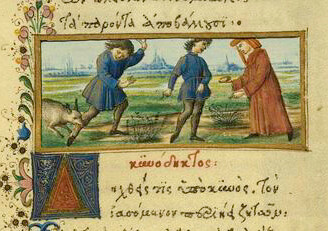HODIE: ante diem decimum Kalendas Martias.
GOOGLE BOOKS: Today's Google Books are Ker's Epigrams by Martial and Paley's Epigrams of Martial. (Yes, I have been working on Martial lately - more about that next weekend!)
MYTHS & LEGENDS: The art image for today's legend shows The Sword of Damocles; you can also see the legends for the current week listed together here.

TODAY'S DISTICHS & EMBLEMS: All the distichs come with vocabulary lists!
RHYMING DISTICHS: The two new Rhyming Distichs are Nescio quid sit amor, Nescio quid sit amor: nec amo, nec amor, nec amavi, / Sed scio, si quis amat, uritur igne gravi; and Quanto dignior es, Quanto dignior es, aut per genus aut per honores, / In te tanto res vitiosae sunt graviores.
CATO'S DISTICHS: The two new Cato Distichs are Esto animo forti, Esto animo forti, cum sis damnatus inique; / Nemo diu gaudet, qui iudice vincit iniquo; and Invidiam nimio cultu, Invidiam nimio cultu vitare memento: / Quae si non laedit, tamen hanc sufferre molestum est.
OWEN'S DISTICHS: The two new Owen epigrams, with Harvey's English versions, are Sol et Tempus, Sol celer est, at sole tamen velocior hora: / Hora stetit nunquam, sol aliquando stetit; and Epitaphium Athei, Mortuus est, quasi victurus post funera non sit: / Sic vixit, tanquam non moriturus erat.
CAMERARIUS'S EMBLEMS: The two new emblems are Pretiosum Quod Utile, Commoda quae est usu non fama, res pretiosa est; / Displicet haec paucis, at placet illa magis; and Me Copia Perdit, Rumpitur innumeris arbos uberrima pomis, / Et subito nimiae praecipitantur opes.
ROLLENHAGEN'S EMBLEMS: The two new emblems are Nequeo Compescere Multos, Perfero; quid faciam? Nequeo compescere multos; / Si vis cedendo vincere, disce pati; and De Parvis Grandis Acervus Erit, Adde parum parvo, parvo superadde pusillum, / Tandem de parvis grandis acervus erit.

TODAY'S MOTTOES & PROVERBS:
TINY MOTTOES: Today's tiny motto is: Confisus viribus (English: Trusting in my own powers).
3-WORD PROVERBS: Today's 3-word verb-less proverb is Gladii in vomeres (English: Swords into ploughshares)
AUDIO PROVERBS: Today's audio Latin proverb is Errores medicorum terra tegit (English: The earth covers the doctors' mistakes). To read a brief essay about this proverb and to listen to the audio, visit the Latin Via Proverbs blog.
PUBLILIUS SYRUS: Today's proverb from Publilius Syrus is: Beneficium accipere libertatem est vendere (English: To accept a favor is to sell your freedom).
ERASMUS' ANIMALS: Today's animal proverb from Erasmus is Piscis primum a capite foetet (English: The fish starts to stink from the head; from Adagia 4.2.97 - a famous saying about how corruption starts at the "top," metaphorically speaking).
TODAY'S FABLES & STORIES:
ANECDOTE OF THE DAY: Today's anecdote is Leonidas, the famous story of Thermopylae.
FABULAE FACILES WIDGET: The fable from the Fabulae Faciles widget is Scarabaeus et Stercus, a story about the dung-beetle and his dung (this one also has a vocabulary list).
AESOP IN ENGLISH VERSE: Today's fable from the English verse widget is The Storks and the Geese, a fable about staying light on your feet, so to speak.
MILLE FABULAE: The "chunk" of Mille Fabulae et Una today is Fable 471, Ciconia et Catus, through Fable 480, Larus et Milvus, including Ciconia et Uxor Eius, an Aesop's fable about domestic violence.
MILLE FABULAE WIDGET: The fable from the Mille Fabulae et Una widget is Canis et Homo Admorsus, a fable about unintended consequences: Quidam a cane morsus, quaerens qui vulnus curare posset circumibat. Cum id quidam casu obvius audisset, “Heus tu,” inquit, “si sanus vis fieri, panem sumito, cum eoque vulneris sanguine deterso, cani qui te momordit edendum praebe.” Tum ille, subridens, “At si istud fecero,” inquit, “nullum erit effugium quin me omnes canes urbis discerpant.”
